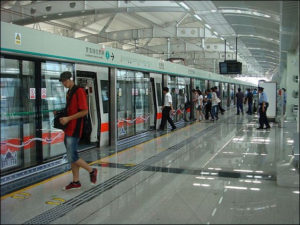
MTR, the Hong Kong commuter rail system, is arguably the world’s most efficient.
Here’s an idea for readers to chew on while the Big Bacon is on vacation: How about privatizing the Washington Metro system? Honk Kong privatized its subway system in 2000, and it has worked out pretty well.
Writing on the Cato Institute blog, Chris Edwards quotes a report by McKinsey:
Hong Kong’s MTR Corporation has defied the odds and delivered significant financial and social benefits: excellent transit, new and vibrant neighborhoods, opportunities for real-estate developers and small businesses, and the conservation of open space. The whole system operates on a self-sustaining basis, without the need for direct taxpayer subsidies.
MTR’s railway system covers 221 kilometers and is used by more than five million people each weekday. It not only performs well—trains run on schedule 99.9 percent of the time—but actually makes a profit: $1.5 billion in 2014. MTR fares are also relatively low compared with those of metro systems in other developed cities. The average fare for an MTR trip in 2014 was less than $1.00, well under base fares in Tokyo (about $1.50), New York ($2.75), and Stockholm (about $4.00).
The ratio of passenger fares to operating costs is a high 185 percent, which means that fares cover not only operating costs but a share of capital costs. MTR raises other funds for capital from real estate deals under which it gains from land value increases near stations — a concept known as “value capture” that we have touted on this blog. MTR is so highly regarded in the mass transit world that it has contracted to run commuter rail systems in cities China, the United Kingdom Sweden and Australia. Why not Washington? (Hat tip: Tim Wise.)
Bacon’s bottom line: It would be unrealistic to expect Hong Kong results in in the Washington Metro. For one reason, Hong Kong is far more densely populated and rail is a more attractive option compared to driving. For another, it’s not clear whether Washington Metro could extract the same economic benefit from putting real estate deals together that MTR could. Zoning controls and land use planning may work very differently in the U.S. than in Honk Kong. But the idea certainly appears to be worth pursuing. If MTR could do no more than bring operational efficiencies to Metro, Virginians would benefit from better service and lower subsidies.


